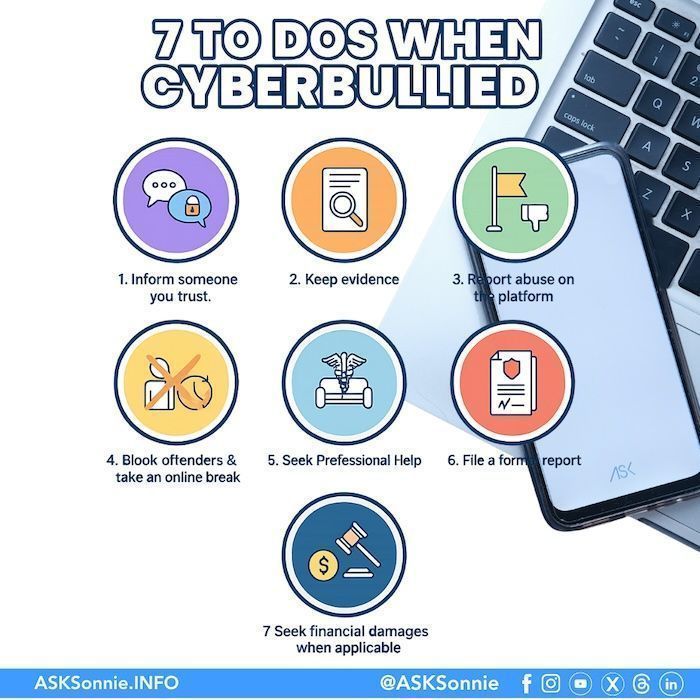Seven To Do’s When Cyberbullied
First Published on Jan. 10,2011 • Updated Nov. 4, 2025
When facing online hate or cyberbullying, awareness and calm action protect your dignity. The Seven To Do’s help you respond wisely — align with truth, strengthen your safety, and kickstart recovery through courage and support.
Harassment doesn’t just happen in classrooms or offices — it spreads through chats, comment sections, and AI-generated content. Though, cultivating a culture of kindness — both online and offline — has been pushed time and again, we cannot always control the actions and attitudes of others. When you are at the receiving end of hate or online harassment, you must be equipped with awareness, emotional resilience, and a practical knowledge of the seven to dos when cyberbullied.
As part of our Cyber Wellness initiative, we continue updating practical guides like this to stay relevant with our evolving digital landscape and the challenges of our time.

💡 Understanding Online Bullying in 2025
Cyberbullying refers to any form of online harassment, intimidation, or humiliation that takes place through social media, messaging apps, email, or AI-generated tools (including deepfakes and manipulated images).
It includes doxxing, spreading false information, mocking posts, non-consensual sharing of private content, or organized online mobbing. 👉 Read also: Cyberbullying 2025: How Hope Counters AI-Driven Aggression
⚖️ Online Bullying as a Digital Human Rights Issue
Free speech is a constitutional right — but when it crosses into harassment or discrimination, it violates a person’s right to dignity and safety. Cyberbullying is a violation of digital human rights: the rights to privacy, security, and freedom from harm.
👉 Related: Free Speech Can Violate a Human Right
📜 Philippine Laws Protecting Online Bullying Victims (2025 Update)
- RA 10627 – Anti-Bullying Act of 2013 — covers schools and minors.
- RA 10175 – Cybercrime Prevention Act — covers online libel, identity theft, and cyber harassment.
- RA 11313 – Safe Spaces Act — protects against gender-based online harassment.
- RA 9995 – Anti-Photo and Video Voyeurism Act — non-consensual intimate media
- ILO C190 and DOLE Guidelines (2025) — safeguard employees from workplace harassment and discrimination.
👉 Learn more: ILO C190 and Workplace Harassment (Philippines 2025 Update)
Seven To Do’s When Cyberbullied: Practical Steps
1. Inform someone you trust.
Students should tell parents or guidance counselors; employees should notify HR if work-related.
2. Keep evidence.
Take screenshots showing URL, date, and username; save copies of messages and emails; don’t delete posts until documented.
3. Report abuse on the platform.
• Facebook — Report links and harassment
• Instagram — Report abuse here
• X (formerly Twitter) — Abusive user form
• Snapchat — Report in app
• TikTok — Report a problem or user
4. Block offenders and take an online break.
Step away and ask someone you trust to monitor your accounts.
5. File a formal report.
📞 PNP Anti-Cybercrime Group – cybercrime.pnp.gov.ph
📧 Reporting a Cybercrime – Department of Justice Portal
Women or minors – contact the nearest PNP WCPD or DSWD office.
6. Don’t hesitate to seek professional help.
NCMH Crisis Hotline (National Center for Mental Health)
☎️ 1553 (Luzon-wide landline toll-free)
📞 0966-351-4518 / 0908-639-2672 / 0917-899-8727 (Globe/TM)
DOH Mental Health Crisis Hotline
☎️ 1553 (for landlines)
📞 (02) 7-989-8727 (Globe/TM)
📞 (02) 7-989-8728 (Smart/Sun/TNT)
In Touch Community Services (Lifeline Philippines)
☎️ (02) 8893-7603
📱 0917-800-1123 (Globe) / 0922-893-8944 (Sun) / 0908-893-7603 (Smart)
🌐https://in-touch.org/
7. Seek financial damages when applicable.
One who is aggrieved by a defamatory post may find refuge in
Art. 2176 of the Civil Code, which allows compensation for injury to reputation or mental anguish caused by malicious acts online (see
Art. 26 on privacy and dignity).
When facing online hate or cyberbullying, awareness and calm action protect your dignity. The Seven To Do’s help you respond wisely — align with truth, strengthen your safety, and kickstart recovery through courage and support.
💡 The ASK Takeaway
The ASK Framework — Align • Strengthen • Kickstart — empowers digital citizens to turn pain into purpose when cyberbullied:
- Align your mindset with truth and dignity. Refuse to internalize hate; ground your identity in values and faith.
- Strengthen your resilience and literacy. Know your rights, use reporting tools, and lean on trusted communities.
- Kickstart positive digital action. Choose empathy, advocate safe spaces, and model respectful online leadership.
ASK transforms adversity into advocacy — aligning, strengthening, and kickstarting hope online.
🌱 Recovery and Support When Cyberbullied
Emotional healing is just as important as the seven to dos when cyberbullied, or any other course of action. Reach out to a trusted friend, counselor, or faith community. Cyber wellness means protecting your mental space and reclaiming your digital peace.
🕊️ When Cyberbullying Leads to Suicide: Why We Must Act
While cultivating a culture of kindness — both online and offline — has been pushed time and again, we cannot always control the actions and attitudes of others. When you are at the receiving end of hate or online harassment, you must be equipped with awareness, emotional resilience, and a clear plan of what to do.
Cyberbullying doesn’t only harm reputations — it can break a person’s spirit.Studies and tragic cases remind us that online cruelty can have irreversible consequences.According to the Philippine National Police, around 2,000 Filipinos took their own lives from January to June 2025, some cases linked to both physical and digital bullying (The POST).
In October 2025, Emman Atienza — a 19-year-old Filipino-Taiwanese social-media creator and mental-health advocate — died after enduring relentless online hate. In her final posts, she confessed feeling “anxious and dreadful knowing there’s going to be some hate I’ll have to force myself to ignore.” (PEP.ph)
Her death sparked national reflection on how toxic online interactions can trigger mental-health struggles. Victims often experience anxiety, sleep disturbance, withdrawal, and loss of self-worth. Without timely intervention, these can escalate to depression or suicidal thoughts.
Creating safer spaces online isn’t just about policies — it’s about empathy. Every comment, post, or share contributes either to healing or harm. As digital citizens, we have the responsibility to speak with respect, pause before posting, and support those who are hurting.
❓ Seven To Dos When Cyberbullied FAQ (2025 Update)
How do I know if I am being cyberbullied?
If you receive repeated online messages, posts, or comments meant to humiliate, threaten, or intimidate you, that is cyberbullying. The intent and impact matter more than the platform.
Where can I report cyberbullying in the Philippines?
File a report through the PNP Anti-Cybercrime Group or the DOJ Cybercrime Portal. You may also approach the nearest PNP Women and Children Protection Desk (WCPD).
Can I sue someone for cyberbullying or defamation online?
Yes. Under Articles 2176 and 26 of the Civil Code and the Cybercrime Prevention Act, victims can seek damages and file criminal complaints if the acts caused harm to reputation or privacy.
How can parents protect their children from cyberbullying?
Monitor digital activity, educate about privacy, and report incidents to schools under RA 10627. Parents should also promote empathy and digital citizenship at home.
What laws protect employees from online harassment at work?
The Safe Spaces Act (RA 11313), Cybercrime Prevention Act, and ILO C190 protect workers from workplace-related online harassment. HR departments must enforce these safeguards.
“Be kind and compassionate to one another, forgiving each other, just as in Christ God forgave you.” — Ephesians 4:32 (NIV)





